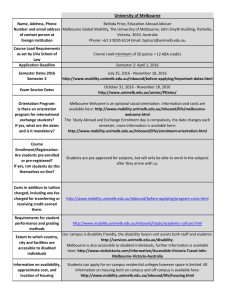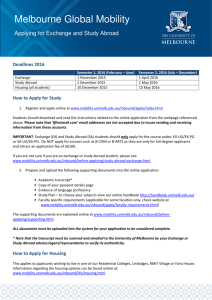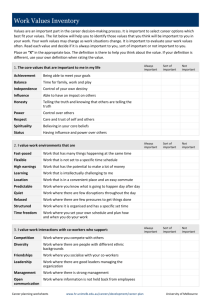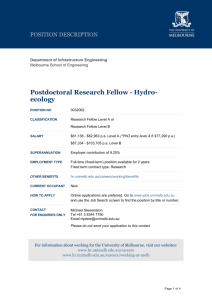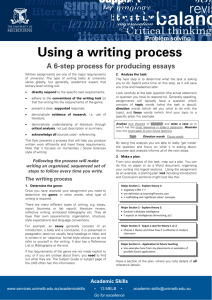University of Melbourne Notes of Guidance for Exchange Students
advertisement
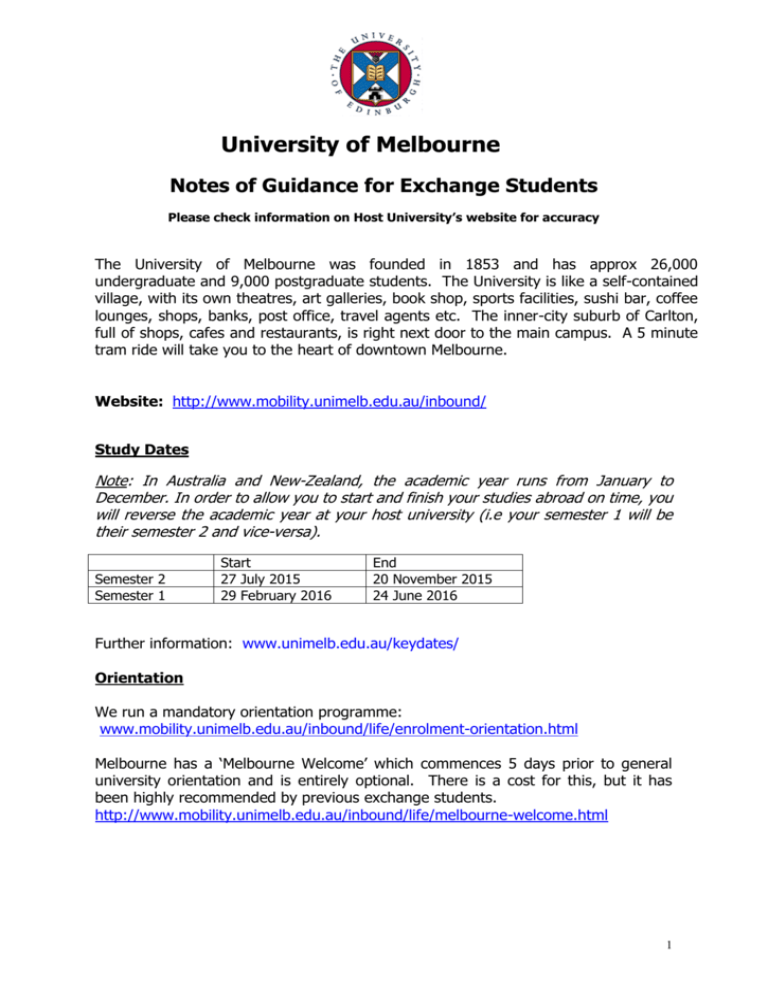
University of Melbourne Notes of Guidance for Exchange Students Please check information on Host University’s website for accuracy The University of Melbourne was founded in 1853 and has approx 26,000 undergraduate and 9,000 postgraduate students. The University is like a self-contained village, with its own theatres, art galleries, book shop, sports facilities, sushi bar, coffee lounges, shops, banks, post office, travel agents etc. The inner-city suburb of Carlton, full of shops, cafes and restaurants, is right next door to the main campus. A 5 minute tram ride will take you to the heart of downtown Melbourne. Website: http://www.mobility.unimelb.edu.au/inbound/ Study Dates Note: In Australia and New-Zealand, the academic year runs from January to December. In order to allow you to start and finish your studies abroad on time, you will reverse the academic year at your host university (i.e your semester 1 will be their semester 2 and vice-versa). Semester 2 Semester 1 Start 27 July 2015 29 February 2016 End 20 November 2015 24 June 2016 Further information: www.unimelb.edu.au/keydates/ Orientation We run a mandatory orientation programme: www.mobility.unimelb.edu.au/inbound/life/enrolment-orientation.html Melbourne has a ‘Melbourne Welcome’ which commences 5 days prior to general university orientation and is entirely optional. There is a cost for this, but it has been highly recommended by previous exchange students. http://www.mobility.unimelb.edu.au/inbound/life/melbourne-welcome.html 1 Academic Work Students should take a full subject load of 100 points (usually 25 points x 8 subjects) for one Normal year. The minimum course/credit Normal course/credit enrolment for student load for an load for a single visa purposes is 75 academic semester/term points for one year. year Students are not permitted to take more than 100 points per year. Students should take a full subject load of 50 points (usually 12.5 points x 4 subjects) for one semester. The minimum enrolment for student visa purposes is 37.5 points for one semester. Students are not permitted to take more than 50 points per semester. Course list : https://handbook.unimelb.edu.au/faces/htdocs/use r/search/SimpleSearch.jsp Course information: Information on course selection : http://www.mobility.unimelb.edu.au/inbound/yourstudies/selecting-subjects.html When will course lists for 2015/2016 be Current list is up-to-date. published? Students will pre-select subjects on an online How and when do students enrol for application. courses? - Students are welcome to take subjects from any area as long as the subject is open and the student Are there any subject areas that are not meets pre-requisites. available or where space is limited? - However some subjects (e.g. Biomedical Sciences) might have quotas. Your final course selection must be agreed with your Exchange Coordinator and any course changes made whilst you are away must have your Exchange Coordinator’s approval. Please ensure that you keep in regular contact with your School (or Schools for joint Honours students) during your year abroad and advise them of your email and mailing addresses. 2 Accommodation Accommodation website: http://www.mobility.unimelb.edu.au/inbound/life/housing.html Is on-campus accommodation guaranteed? Available but limited. One in four study abroad/exchange students who apply for Colleges are successful in gaining a place. When is the accommodation deadline? To be notified. How do students apply for accommodation? As part of the application process. Can students choose to stay in private accommodation? Do you provide advice to help students find private accommodation? If so please provide a link. Yes For those who wish to organise their own accommodation, the university can arrange temporary accommodation and provide them with access to share house, rental property and home-stay listings upon their arrival. Please refer to the accommodation link. Costs What is the estimated cost of Estimated AU $20,000 – 30,000 per year. Please check living per academic year? http://services.unimelb.edu.au/finaid/planning/cost_of_li ving Do you have any administrative fees for incoming exchange students? Do you have a compulsory or non-compulsory health insurance scheme? If so please provide a link to further information: No What is the cost of the To be confirmed. insurance per semester / term? What is the cost of the insurance per To be confirmed. academic year? Compulsory Overseas Student Health Cover (OSHC) provided by Worldcare Health Assistance must be paid before visa papers can be issued. www.services.unimelb.edu.au/international/visas/oshc.h tml 3 Visas Students coming from overseas to study at the University of Melbourne must have a student visa unless they are an Australian or New Zealand citizen. Students on study abroad or exchange apply for visa sub-class 575, non-award. They can do this once we issue a document called a Confirmation of Enrolment (CoE). We don’t issue this until students have accepted their offers and met any conditions required. Students must obtain their Student Visa before arriving in Australia. Further information: www.immi.gov.au/students/index.htm http://services.unimelb.edu.au/international/visas/apply If you are a Chinese national, you are required to obtain Pre-Visa Assessment (PVA) before you can apply for your visa. Your host institution needs to receive proof of your PVA before they can process your assessment and issue you with your Confirmation of Enrolment (COE) which is what you need to apply for your visa. Pre-visa assessment can take up to 6 weeks. It is very important you apply for it as soon as you receive your letter of offer. To apply for pre-visa assessment contact your nearest Australian Diplomatic mission. Employment Students should not depend on earnings from part-time work to meet their living expenses while in Australia. However, it is possible to work for 20 hrs per week, although Melbourne recommends that you do not work more than 8 hrs per week. During vacation times you can work full time. Safety We hope your stay at your exchange destination will pass without any undue incident with regard to your safety. However, as you will be staying in a different environment and culture, you should be prepared to take necessary precautions if appropriate. We would advise you to consult with the Study Abroad Office on your arrival and also look at the following website which will give you up-to-date government information on the country you will be visiting. http://www.fco.gov.uk/ If you find yourself without any access to cash, without your passport, or in any other serious kind of trouble, the British Consulate will try to help. In the unlikely event of you being arrested for a serious offence, insist on the Consulate being informed; a consular officer who can advise on local procedures etc will contact you as soon as possible. 4 Please also inform the International Office and your Personal Tutor of any problems relating to your health or safety whilst on your study abroad exchange. Disability Statement Some destinations may be more accessible than others for disabled students. If you require any adjustments due to disability or specific learning difficulty and you wish to study abroad please contact Thomas Ozers in the International Office (Thomas.ozers@ed.ac.uk). We will work together with you to explore the help available at your host institution. It might also be helpful if you discuss this with your Personal Tutor and the Disability Office as well. These notes are for guidance only. We have tried to keep them up to date, but it is very difficult to do so without your input. So, if you can keep notes of any inaccuracies in this information we should be glad to hear of them on your return to Edinburgh. Any other observations and impressions about your stay will also be useful and will help those students who participate in the exchange in future years. ============================================================== International Office, University of Edinburgh, 33 Buccleuch Place Edinburgh EH8 9JS tel: 0131 651 1927 email: international.outgoing@ed.ac.uk ============================================================== 5
